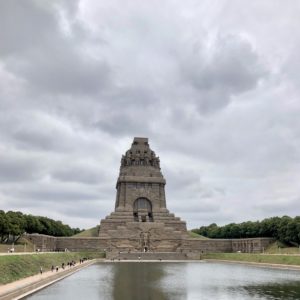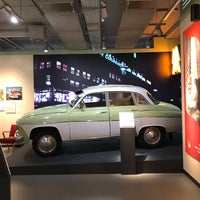Last weekend, I traveled with the Goethe Institute to Leipzig, located about an hour and a half east of Dresden by train. Like Dresden, Leipzig is home to several museums, monuments, churches, and even a zoo, which houses the world’s largest primate facility. Though we unfortunately didn’t have enough time to visit the zoo, a highlight for me was visiting das Völkerschlachtdenkmal, or the Monument to the Battle of Nations. Completed in 1913, this monument was constructed to commemorate the defeat of Napoleon at the 1813 Battle of Leipzig, and later served as the location where the defenders of Leipzig made their last stand against U.S. troops in WWII. If you haven’t already noticed from my blog posts, anything history related is bound to capture my attention, so this monument – an architectural anomaly compared to the rest of the city – was high on my list.

However, before visiting this monument, we also toured das Zeitgeschichtliche Forum, or the Forum of Contemporary History. Within this museum, which focuses on the history of Germany since the end of the Second World War, the history of die Deutsche Demokratische Republik (DDR)was significantly featured. For me this was interesting not only because it is a part of a history about which we don’t learn very much in the American education system, but also because my au pair and her family lived and worked in Dresden during the existence of the DDR. As such, this topic has generated a great deal of discussion between myself and my German family.
To give these conversations some context, I’ll provide a brief history of Germany within the last 70 years. At the end of WWII, the Allies agreed to divide Germany and its capital, Berlin, into four zones of occupation – American, British, French, and Soviet. However, a few years after this agreement, the American, British, and French zones in the west were unified into die Bundesrepublik Deutschland (the Federal Republic of Germany) and granted sovereignty. Thus by 1949, only two zones divided Germany and Berlin, die Bundesrepublik Deutschlandmonitored by the United States and die Deutsche Demokratische Republikcontrolled by the Soviet Union. If you remember anything from your high school history classes, you will recognize that these two zones represented the two clashing powers and economic philosophies of the Cold War, which dominated the politics of the late 20th century. As West Germany reconstructed itself along capitalistic principles, East Germany rebuilt under communistic ideology – an episode whose effects are arguably still present within the cultures and economies of eastern and western Germany.
As part of an educational system still particularly influenced by the politics and fear surrounding communism in the United States throughout the Cold War, the Soviet Union was portrayed to myself and my fellow classmates in a rather unfriendly light. Thus, with my likely heavily biased understanding of the Soviet Union and life in East Germany, it was initially somewhat difficult to comprehend the feelings of “Ostalgie” – or nostalgia for East Germany under the DDR – expressed by my German family and others whom I met. However, after talking with my family about this at great length, I feel as if I have a better understanding of these sentiments, and I even empathize with them in many ways – but keep reading before you label me as a millennial product of the left “fake news” propaganda!
As a political science major, I’ll keep this discussion as diplomatic as possible. To claim that the governmental and economic policies of the Soviet Union were successful would be uninformed, especially considering its ultimate dissolution in 1991. Nevertheless, for some people, life under the DDR was often preferable to life under today’s unified Germany. How is this possible? Wouldn’t one prefer to live in a society with greater choice and opportunity – even down to the variety of items in a grocery store or number of channels on a television?
As products of the American capitalist society, freedom of choice is ingrained into our culture, and it is hard to imagine a life without it. A cereal aisle with only four or five different cereal choices rather than 70 or more? Unthinkable!
This is how my family explained their experiences to me. Despite its flaws, the DDR was capable of providing to many people at least the facade of equality. Throughout their neighborhood, everyone had basically the exact same furniture, clothes, technology, and income as each other. As a result, it seemed as if people were less envious of one another – it’s hard to be envious of something that no one has. So, no one was envious of the new flat screen TV that their neighbors just bought or the newest iPhone that their friend has because it wasn’t really possible. Even though people may have had less, life was more satisfying. As much as we may not like to admit it, every time a new iPhone is released, our current iPhone becomes just slightly less satisfying – especially if all of your friends already have the newest model. Thus, it’s easy to become envious of others, breaking apart the bonds of community even further. Rather, the DDR provided a life of somewhat greater simplicity. Fewer options may mean less choice, but it also is often less stressful – you know what you’re going to get. Though jobs may not have been as lucrative, they were secure, and unemployment was unlikely. Even in the U.S. a desire for a more simple life is quite understandable.

Although their opinions certainly do not represent all or maybe even a majority of those who lived in the DDR, I can’t help but be fascinated by these conversations that I have with my family. And, if you remember from my first blog post, only their daughter speaks English, so to say that these conversations are a great way to practice my listening and hearing skills may be an understatement – especially considering the fact that they both speak with a relatively thick Sächsisch dialect. Though at times it may be frustrating that I can’t express myself in the ways that I want to, I enjoy every moment and look forward to having a new conversation soon!
Bis zum nächsten Mal!